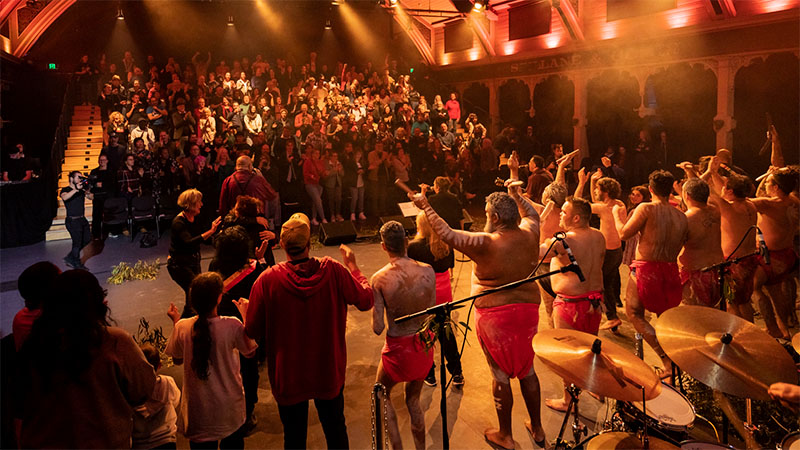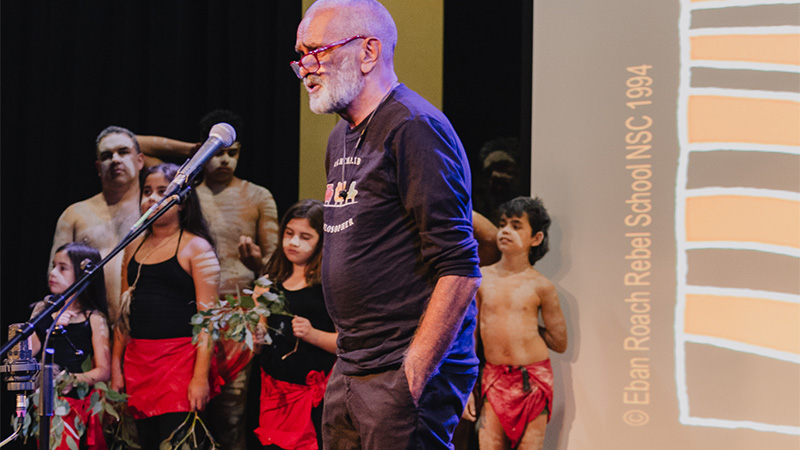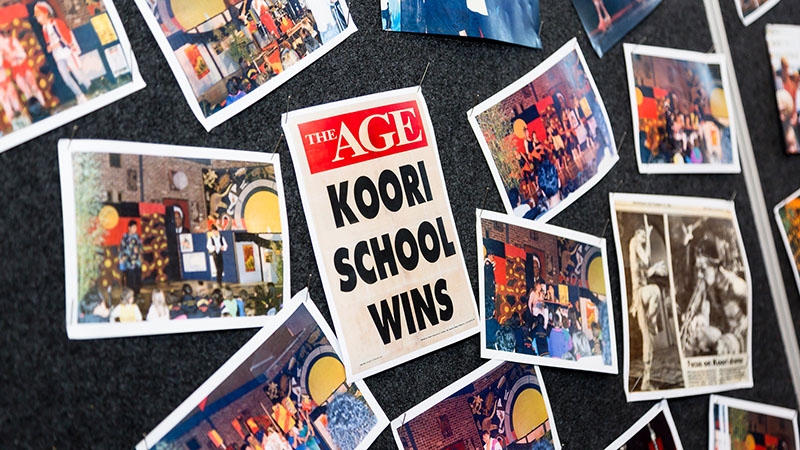Aboriginal History Archive (AHA)
The Aboriginal History Archive (AHA) was built around the Foley Collection and has since grown with donations of material from a number of key individuals and organisations.
It houses items arising out of the Aboriginal Black Power, Land Rights and Self-Determination movements. It spans a century of activism from the 1920s onwards.
Scholarships
The Aboriginal History Archive is seeking expressions of interest from undergraduates and postgraduates with a strong understanding of the nature of community control to fill a range of positions and scholarships.
Position available for new research project
The Aboriginal History Archive is leading a project to unearth Indigenous history, stories, alternative narratives and learnings from the past. We will engage communities, present into the public debate, provide materials for curricula and, most importantly, turn the normative discourse on the impact of colonisation in Victoria.
Scholarships are available with an annual stipend value of $45,000 per year. You must be Aboriginal and/or Torres Strait Islander to apply for the scholarship.
Join this project for a unique opportunity to contribute to impactful research in Indigenous history, truth and justice, and generate results to support, accelerate and directly impact the work of the Justice Commission.
Send your expression of interest to or .
Other positions within the AHA
- Internships
- Masters scholarships
- PhD scholarships
- Postdoctoral Research Fellows Community Researchers
If you're interested in any of these positions, please email .
The Collection
Most of the material has been collected by Professor Gary Foley throughout his fifty-year career as an activist, performer, polemicist, historian and teacher.
It includes:
- manifestos and minutes
- essays and articles
- journals and newsletters
- memoirs and diaries
- course outlines and proposals
- posters and flyers
- news clippings and correspondence
- photos and audio tapes
- moving images on a variety of platforms
- a mass of ephemera.
All together, there are over 80,000 items housed in the physical archive, and it continues to grow. Nearly all of this has been catalogued and digitised. Material is available on request. Please email for more information.
A number of records have also been made available to the public through Victoria University’s Research Repository.
The Patrick Wolfe book collection is incorporated into the AHA. The collection contains around 1,400 books and a few single journal issues, which formed the personal library of Patrick Wolfe. Victoria University Library manages this collection on behalf of the AHA, and material can be viewed by appointment in the Special Collections reading room on level 4 of the Footscray Park campus library in consultation with the AHA. Further information can be accessed through the Library Guide VU Special Collections - How to access and use: Patrick Wolfe.
Acknowledgement of Country
The guardians of the Aboriginal History Archive (AHA) acknowledge the custodians of Country throughout the continent now commonly referred to as Australia. We recognise their continuing connection and responsibilities to land, waters and community. We know that sovereignty has never been ceded and treaties never signed. We offer our respect to Aboriginal and Torres Strait Islander cultures and to Elders past and present.
Significance
The AHA offers sources upon which the dominant version of post-invasion Australian history can be challenged, reappraised and rewritten.
‘White Australia has a Black History’ is a well-worn political slogan that this archive makes real. In doing so, it demonstrates that the newcomers to this country continue to have much to learn from its Aboriginal and Torres Strait Islander guardians – not only in ‘traditional’ areas like landcare, but with contemporary issues like the development of community-controlled social services.
The material illustrates not only exploitation, repression and suffering, but also, and more importantly, Aboriginal struggle, confidence, pride and innovation.
The archive’s chief characteristic is that it contains comprehensive and diverse documentation of the activities of the members of the Black Power Movement and their crucial role in devising strategies for Indigenous Australian self-determination and developing community based and controlled infrastructure. Beyond that, it brings together a huge range of material – academic, political, personal, historical – that sheds light both on Aboriginal matters since the invasion and on wider social, cultural and political issues, both national and international.
Objectives
The development of this archive has been informed by its creators' desire to:
- provide a culturally appropriate facility through which Aboriginal and Torres Strait Islander people can discover, explore, manage and share their own stories
- inform and enhance the teaching and learning of Aboriginal history, culture and politics for all people, across all sectors and at all levels of education and training
- provide researchers, students, communities and the public at large with access to material that reveals the strong and active record of Aboriginal self-determination
- fill gaps in Australia’s current historical record with a comprehensive, authentic and well-conserved collection of primary and secondary material on Aboriginal political, social and cultural movements
- influence the nature of Australian cultural politics through education about the history and politics of self-determination and community control for all peoples
- provide an accessible repository into which a regular flow of new material can be efficiently integrated
- facilitate digital access to primary sources on Aboriginal history and agency that are easily discoverable and citable in a scholarly manner.
Governance
The archive is under Aboriginal control and operates on key principles of Aboriginal leadership.
The archive’s Governance Group provides overall leadership, guidance and guardianship of the collection to ensure culturally safe and efficient processes across all functions. It is the centrepiece of Victoria University’s Aboriginal research, conducted within the Moondani Balluk Indigenous Academic Unit.
A Fight for Survival: The Northlands Story
A remarkable battle that Victorians and Australians have been able to learn about through the Aboriginal History Archive is the 1992-1995 campaign to save Melbourne school Northland Secondary College from closure. Gary Foley played an important role in the successful community struggle to save the school after it was placed on a closure “hit-list” in late 1992 by the incoming Kennett government. Professor Foley’s son Bruce, who attended the College, joined with fellow student Muthama Sinnappan to lodge a complaint with the Equal Opportunity Board claiming that the government’s decision to close the school was discriminatory. Alongside what became a long-running legal battle, teachers, parents and students maintained a Rebel School for two years, and kept the story in the public eye.
The Aboriginal History Archive contains a significant tranche of unique original materials that reflect the Northlands campaign from within:
- footage shot by media teachers & students
- court transcripts
- correspondence & media releases
- even a hand written Rebel School diary and minute book.
Instigated by Professor Foley, and with Dr Clare Land, Lyn Thorpe and Jill Morgan AM forming the key day-to-day research, community liaison & creative development team, Northlands community members have regathered to tell the story in true Northlands style. A Political Cabaret and Exhibition are the first two major productions so far under the banner of “A Fight for Survival: The Northlands Story.”


